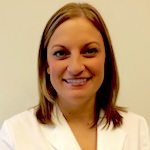If you're an advanced provider, you’ve chosen a versatile career that offers many paths to satisfy your personal goals and ambitions. If you’re just beginning your career, it may seem premature to think about professional development and leadership opportunities.
But I’m here to tell you that it’s never too soon to consider your professional growth. With some thought and planning, your big break might come sooner than you expect. I know it did for me.
I began my career as an ICU nurse. After two years in the ICU, I went back to school to earn my Master of Science in Nursing (MSN) and became a board-certified family nurse practitioner in 2012.
I joined the hospital medicine program at
Memorial Hospital in Belleville, Ill., as a new graduate nurse practitioner (NP) and helped build the nurse practitioner program from the ground up. When our group joined Vituity two years later, I had the opportunity to become a site lead and jumped at the opportunity.
In today’s post, I’ll share my career path and explain how new advanced providers can find leadership and professional growth opportunities.
Building a Nurse Practitioner Program
Here at Belleville, NPs are an integral part of the hospital medicine care team. With the help and support of our physician colleagues, we've designed a model that plays to the strengths of both disciplines.
For example, NPs are responsible for admitting patients who come through our emergency department. Once patients are admitted, we perform exams, histories, and physicals; formulate diagnoses; develop treatment plans; and submit orders.
This level of responsibility presents new NPs with a wealth of learning opportunities. We see the patients at the most acute phase of their episode of care and learn how to approach diagnosis and treatment. And we're supported by our hospitalist physician partners, who are truly some of our best teachers.
As new NPs gain more experience, they are transitioned into other roles within the progression of care. For example, NPs do daily rounding on patients who have multiple comorbidities and exacerbations of those comorbidities. As the attending providers of these patients, NPs manage their care and progress them through their hospital stay, working closely with physicians, social services, care management teams, physical and occupational therapy, and many other services.
We’ve also established a nurse practitioner-run consult service for medically complex patients who require attentive perioperative medical care. NPs perform preoperative medical evaluations and risk stratification to assess readiness for surgery. Postoperatively, we provide medical management to facilitate continuity of care and reduce the likelihood of complications.
One of the most satisfying parts of this model is collaborating with our physician colleagues. They support us when we have questions and help to ensure our treatment goals are on track.
That being said, we NPs have autonomy to manage our patients. Because of the success of these NP-led hospital medicine programs, we are viewed as an integral part of the team here at Belleville. The physicians truly appreciate us and value the NP-run model of care.
Personally, I’ve cherished the endless opportunities to grow in my practice over the last five years. I’ve reached a high level of autonomy very early in my career. Growing the NP program from two NPs when I started to eight NPs today has also been incredibly rewarding. These leadership opportunities have definitely kept me engaged and challenged.
Keys to Success
There’s no way around it: growing a thriving NP program takes time and hard work. But we would not have achieved our level of success without several important ingredients:
Physician support
Having physician buy-in and respect has been instrumental in our ability to work autonomously and grow the NP program. In my evaluations with NPs, many say that having that physician support system boosts their confidence in taking care of acutely ill patients.
NPs in department meetings
Being included in department meetings at Belleville makes NPs more vested in the site and helps us understand the bigger picture. Physicians view us not just as employees, but also as integral partners in the practice. We have a voice in making the practice more successful and are free to discuss issues that hinder success.
New NP onboarding
Because of the high level of autonomy in our roles, taking the time to introduce a new NP to the culture, structure, and systems of our department through a formal onboarding process is essential. It builds a new employee’s sense of belonging, confidence, and allegiance.
Vituity America culture
In 2014, Belleville’s
hospital medicine department joined Vituity, which provides an extra level of support to develop a practice model to meet the needs of our hospital.
Vituity’s support, tools, and professional development opportunities allow us to grow in our careers and practice to the full extent of our training. This support from and collaboration with our
Vituity ED colleagues at Belleville laid the foundation for developing the NP admitting model that has been so successful.
Endless Leadership Opportunities
While I love practicing medicine and caring for patients, my true passion lies in mentoring new graduates who are just beginning their hospital medicine careers. I am fortunate to work for an organization that provides so many avenues to help coach and mentor others.
To help hospitalist advanced providers new to
Vituity thrive, I bring them out to Belleville, where they spend a week with me to learn the ropes and
Vituity culture. After the intensive weeklong training, I stay in touch with them to make sure things are going well and they have the support they need at their site. I often refer to this program as my third child, because it’s so important (and rewarding) to see new advanced providers succeed in their careers!
I also help teach
Vituity’s three-day hospital medicine boot camp. It’s an intensive training that covers diseases and medical terminology, as well as coding and billing issues relevant to advanced providers. We talk about
Vituity’s culture and the role of advanced providers within the organization.
During boot camp, advanced providers also participate in “morning report,” where they analyze and discuss different clinical scenarios and help formulate clinically sound treatment approaches.
While balancing my various roles and responsibilities can be a bit of a juggling act, I enjoy the variety and can honestly say I get back so much more than I give.
And the Award Goes to…
Every year,
Vituity honors teams and individuals for exemplary performance at its Annual Partnership Meeting. As the presenters were building up to announce the 2016
distinguished service award winner for an advanced provider in hospital medicine, my colleagues were whispering, “It has to be you, Deanna.”
“No, it’s not me,” I assured them.
“Put your purse down, Deanna,” they said. “It’s you!”
Sure enough,
Vituity presented me with the award for my work to make our hospitalist program the best it can be. I was humbled and honored, to say the least.
Both my clinical practice and my teaching and leadership roles are near and dear to my heart. I hope to continue to use my experience to help NPs and PAs grow professionally and build successful programs like we have here at Belleville.























